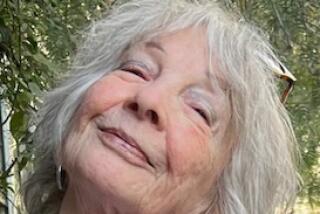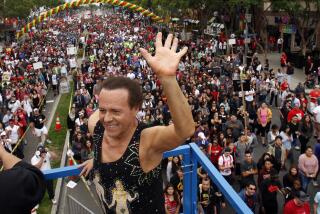Richard Sherman, who supplied the songs and musical magic for Walt Disney, dies at 95
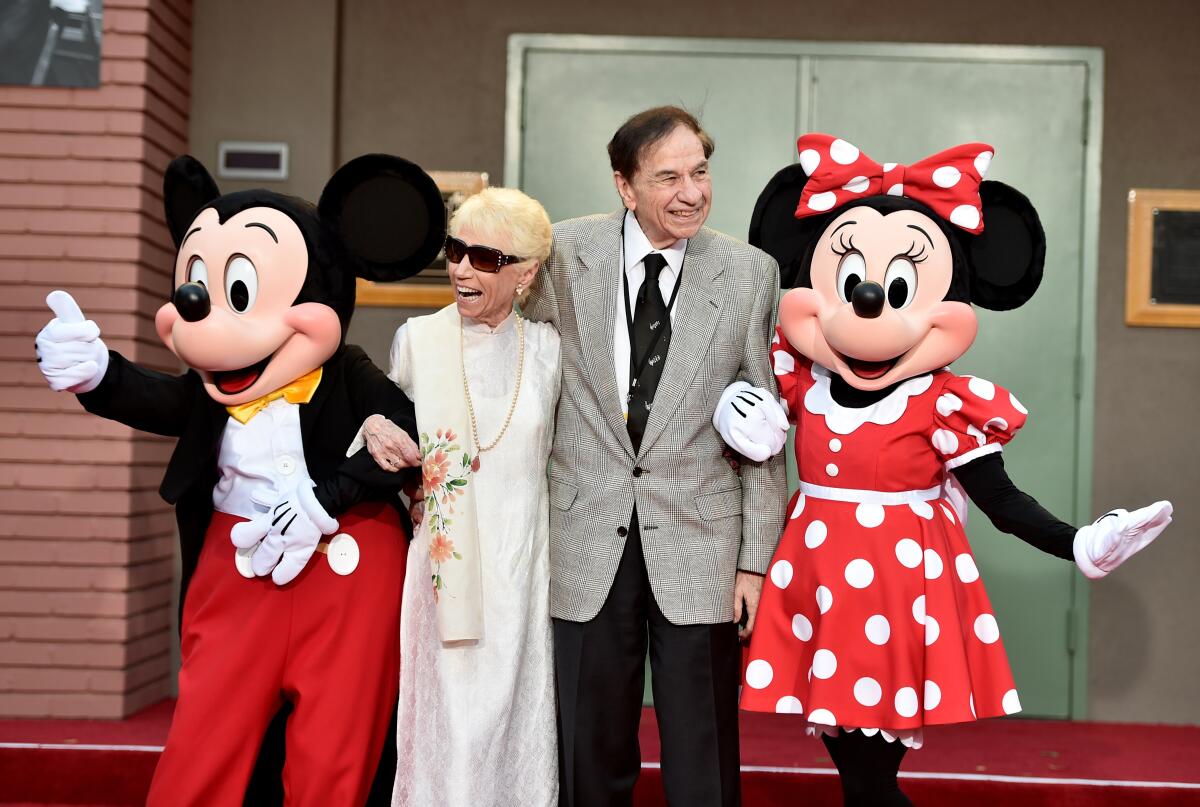
To Walt Disney, who personally invited Richard and Robert Sherman to become full-time staff songwriters at his Burbank studio in 1960, they were the “boys.”
The Sherman brothers were the ideal match for Disney’s family-film factory, where they built a career creating what Richard Sherman once described as “upbeat, spirited, happy songs that make people feel good.”
The songwriting siblings were responsible for the bouncy, tongue-twistingly memorable “Supercalifragilisticexpialidocious” and “A Spoonful of Sugar” from the hit 1964 movie musical “Mary Poppins,” for which they won two of the film’s five Oscars — for score and song, for the haunting “Chim Chim Cher-ee.”
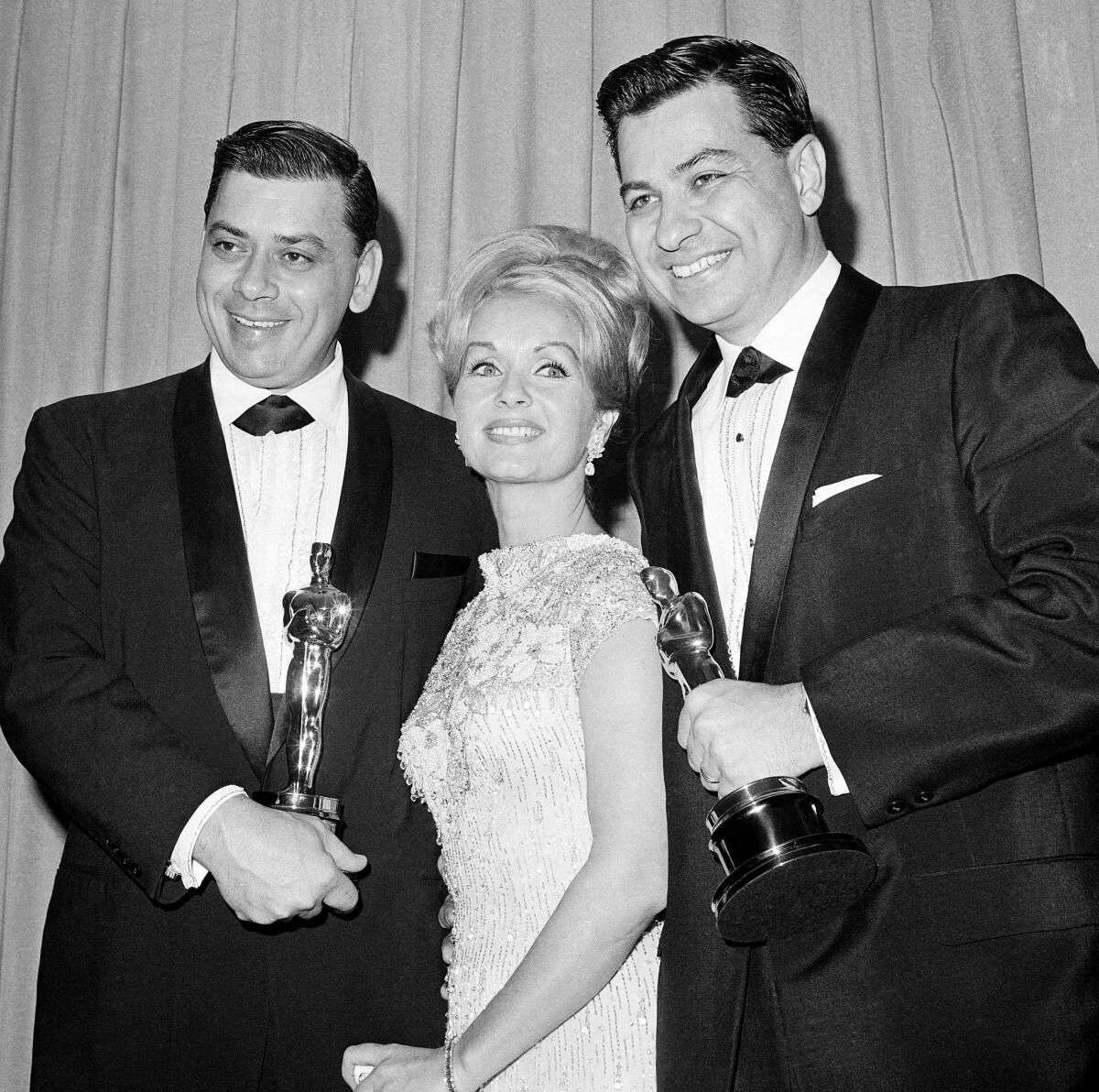
During their years at the studio, the Shermans were as much a part of the early Disney magic as the imagineers, who designed the theme parks and created the rides. Together, they wrote dozens of songs for Disney TV productions and movies including “The Parent Trap,” “The Absent-Minded Professor,” “Summer Magic,” “That Darn Cat!,” “The Sword in the Stone,” “The Jungle Book,” “The Aristocats,” “Bedknobs and Broomsticks” and “Winnie the Pooh” cartoons.
They also penned the theme song for Disney’s TV show “The Wonderful World of Color” and wrote songs heard in Disney theme-park attractions, including “The Tiki Tiki Tiki Room,” “There’s a Great Big Beautiful Tomorrow” and the unforgettable — in ways both good and bad —“It’s a Small World (After All).”
“They were made by God for Walt Disney,” said Dick Van Dyke, who starred in “Mary Poppins” opposite Julie Andrews. “They somehow managed to convey Walt’s meaning in those songs.”
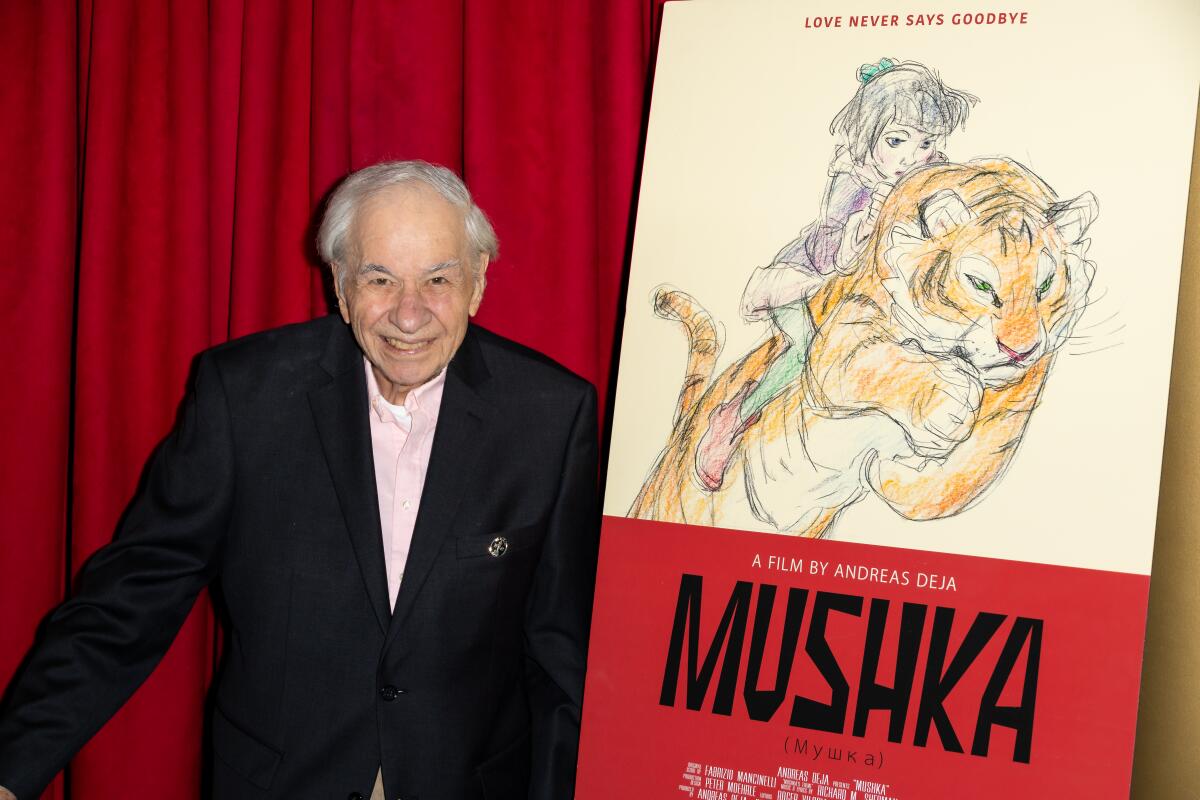
The gregarious half of the prolific songwriting duo, Sherman died May 25, at Cedars-Sinai Medical Center in Beverly Hills, due to age-related illness. He was 95. The Walt Disney company announced the news of his death in a press statement.
Robert Sherman, who was 2½ years older than his brother, died in London in 2012 at age 86.
The brothers were struggling songwriters when they (and Bob Roberts) wrote “Tall Paul,” which became a No. 7 hit in 1959 for Annette Funicello, whom the brothers regarded as their “Luck Star.”
That led to the Shermans writing a string of other pop songs for the ex-Mousketeer, including the hit “Pineapple Princess.” And that, in turn, led to assignments writing songs for various film and TV productions at the Disney studios.
During one fateful meeting with “the boys” in August 1960, Disney handed them a copy of a book and said, “Read it, and tell me what you think.”
The book was “Mary Poppins,” P.L. Travers’ tale of a magical English nanny.
Sherman considered “Mary Poppins,” which starred Andrews in the title role and Van Dyke as Bert the chimney sweep, as “the turning point in our lives, and it’s the highest point in our career.”
After reading the book, he and his brother “underlined some chapters that we felt were really musical. And when we showed Walt our notes and played the song sketches, he pulled out his book, and he’d underlined the very same chapters,” Sherman recalled in a 2011 interview with the Patriot Ledger of Quincy, Mass.
At the end of their meeting, Disney surprised them by asking them if they’d like to work full-time at the studio.
It was, Sherman said, “the greatest day of our lives.”

He never forgot the moment, once “Mary Poppins” got underway, when he first heard Andrews singing one of their songs for the movie.
“She sang ‘A Spoonful of Sugar’ in her incredible voice,” he recalled in a 2011 interview with the Philadelphia Daily News. “I was sitting in [the recording] booth listening to it, and I was crying. It was magical.”
Van Dyke told The Times after Robert Sherman died that the Sherman brothers were “deeply involved” throughout the filming of “Mary Poppins,” which earned Andrews a lead actress Oscar.
“They were always on the set helping Julie and I with our interpretation of the songs,” he said. “They had a lot to do with the atmosphere, the lightness.”
The Shermans’ hauntingly poignant “Feed the Birds,” sung about an older woman selling bags of crumbs to feed the hungry birds, was Disney’s favorite song from “Mary Poppins.”
The song, Sherman told the Philadelphia Daily News in 2011, was really a “prayer for understanding — be kind, give love. It doesn’t cost anything.”
When Disney first heard their musical concept for the song, he told them, “That’s what it’s all about, isn’t it?”
From then on, Disney would often meet with the Shermans in his office on Friday afternoons to discuss what was going on at the studio. Then he’d say, “Play it.”
“So I would play piano and sing ‘Feed the Birds’ for him,” Richard Sherman recalled in a 2004 Sacramento Bee interview. “Then he’d say, ‘Well, have a good weekend, boys,’ and we’d go home. That was our Friday afternoon.”
After Disney died in 1966, “It just wasn’t the same,” Sherman said in a 1985 Times interview. “I really don’t want to say anything negative about anyone [at Disney]. It just wasn’t the same with Walt gone.”
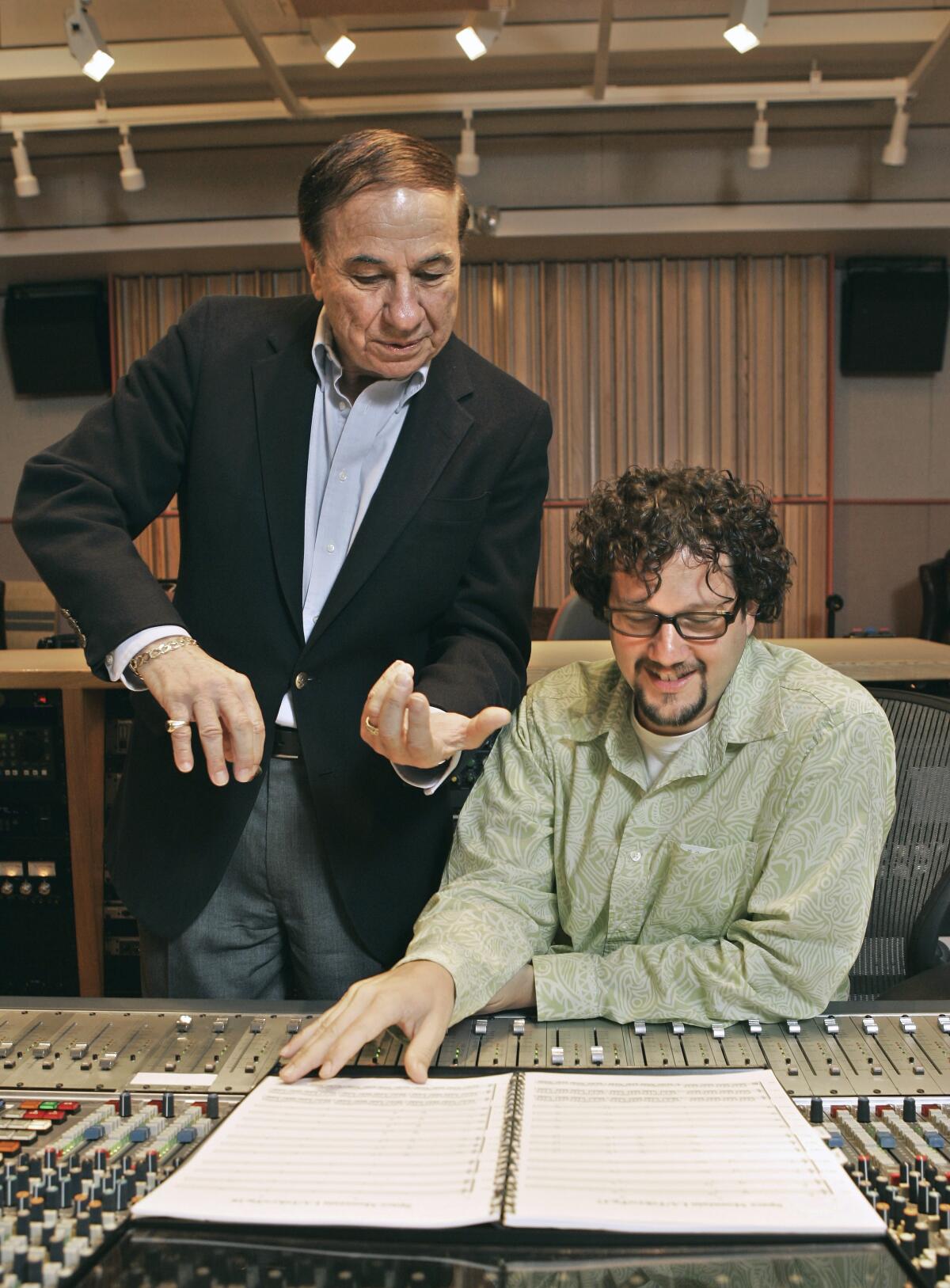
After leaving the studio in 1968, the Sherman brothers wrote songs for films such as “Charlotte’s Web” and collaborated on screenplays for films such as “Tom Sawyer,” “Huckleberry Finn,” “The Slipper and the Rose: The Story of Cinderella” and “The Magic of Lassie.”
They also wrote the music and lyrics for the Tony Award-nominated 1974 Broadway musical “Over Here!” starring Maxene and Patty Andrews.
Besides their two Oscar wins for “Mary Poppins,” they received five Oscar nominations for their work on “Chitty Chitty Bang Bang,” “Bedknobs and Broomsticks,” “Tom Sawyer” and “The Slipper and the Rose.”
The Shermans, who were inducted into the Songwriters Hall of Fame and received a star on the Hollywood Walk of Fame, were awarded the National Medal of Arts in 2008 for their creation of music that “has helped bring joy to millions.”
The son of Tin Pan Alley songwriter Al Sherman, Richard Sherman was born in New York City on June 12, 1928. The family moved to Beverly Hills in 1938.
While Richard attended Beverly Hills High School during World War II, Robert served in the Army in Europe, where he was among the first GIs to enter the Dachau concentration camp after the Germans fled, and was later seriously wounded in the knee.
After the war, both brothers entered Bard College in Annandale-on-Hudson, N.Y. Robert studied literature; Richard majored in music.
After they graduated, Richard had ambitions of becoming a symphonic composer and his brother had designs on writing the great American novel. But as Richard later recalled, “Nothing was happening with either of us.”
They were sharing a small apartment above a dry cleaner on West Pico Boulevard in 1951 when their father offered them a challenge: Write a song that some kid would give up his lunch money to buy.
They wound up writing a country-western song called “Gold Can Buy Anything (But Love),” which was recorded by singing cowboy star Gene Autry in 1951.
More songs followed, but the brothers went their separate ways after Richard served a stint in the Army from 1953 to 1955.
Both had written songs with other partners before they reteamed in 1958 for “Tall Paul.” Among their hits was Johnny Burnette’s 1960 recording of “You’re Sixteen,” which peaked at No. 8. It reached No. 1 in 1974 when Ringo Starr recorded the song.
Although Richard was primarily the composer and Robert the lyricist, they typically worked together on both the words and music. Indeed, when asked who did what, their standard reply was, “He writes the words and the music, and I write the music and the words.”
Despite their close professional collaboration — they often completed each other’s sentences — the Sherman brothers and their families led separate personal lives beginning in the mid-’60s.
Their strained personal relationship was revealed in the 2009 documentary “The Boys: The Sherman Brothers’ Story,” directed by Richard’s son, Gregory; and Robert’s son, Jeff.
“There wasn’t a single specific incident. But I remember the walls going up between our fathers and our families in 1965,” Jeff Sherman told the Toronto Star in 2009.
“Bob and I have great love and respect for one another, and during our professional lives we maintained a façade of unity,” Richard said. “But in order to keep working together we came to an agreement to live our personal lives apart, completely separate. We were comfortable working together, but otherwise it would have been explosive.”
They were, he said, “very different people.”
“In the broadest terms, Bob is an introvert who wanted to write great novels, and I was the showman,” he said. “I loved to perform, and he’d rather sit in a corner reading a book. …
“We’re not idiots. We had something good going on. Success and creativity won out over petty personal differences. There was no way we were going to let those differences destroy our work.”
Richard is survived by his wife of 66 years, Elizabeth; son Gregory and grandsons William and Matthew; and daughter Victoria Wolf, son-in-law Doug Wolf and grandchildren Mandy and Anthony. He is also survived by his daughter from a previous marriage, Lynda Rothstein, as well as her two children and three grandchildren. A private funeral is scheduled to take place May 31 at Hillside Memorial Park and Mortuary in Los Angeles. Plans for a celebration of life will be announced at a later date.
McLellan is a former Times staff writer.
More to Read
Start your day right
Sign up for Essential California for the L.A. Times biggest news, features and recommendations in your inbox six days a week.
You may occasionally receive promotional content from the Los Angeles Times.



